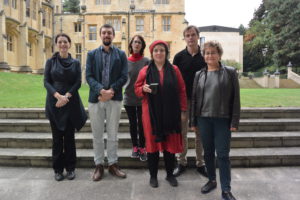
On 16 October, 2017, the Nomadic Empires project held a workshop in Oxford entitled “Assembling a Nomadic Archive”, presented by Kathryn Babayan, Associate Professor at the Department of Near Eastern Studies and the Department of History at the University of Michigan, who specializes in medieval and early-modern Persianate studies; cultural, social, and political histories of Iran, Iraq, Anatolia, and Central Asia; as well as in the studies of gender, sexuality, and subaltern groups.
Kathryn Babayan delivered a presentation about her experiences with assembling a nomadic archive for her case study of the Qizilbash—a tribal Turkic-speaking community with pastoral nomadic roots that served as a backbone for the Safavid imperial ascendance in Iran in the 15th century—the focus of her well-received monograph “Mystics, Monarchs, and Messiahs” (2002). She discussed sources, media, and technologies of nomadic archives and how their material culture is impacted by mobility and displacement. She shared her ideas with the team about the cultural and ‘materialist modes of analysis’ of such archives, while stressing the importance of epics, poetry, and visual media as sources for writing nomadic histories.
The team and Dr Babayan explored the questions of who controls the nomadic archive—how and by whom it is constituted and which sources should be considered representative of nomadic lives and agency. The issues of gender (i.e. female presence vs. exclusion in royal scenes of authority) and ethos and aesthetics of mobility (i.e. dynamism, portability) were also the focus of the group discussion. Another central topic of this workshop was the role of Sufi and Shia mysticism and the importance of the religious dimension in nomadic politics, authority, and sovereignty, as it was demonstrated by Babayan in her discussion of the Qizilbash, and corroborated by the case studies of the Golden Horde Mongols, the Khazars, and the Rumies—some of the subjects of the Nomadic Empires team’s monographs.